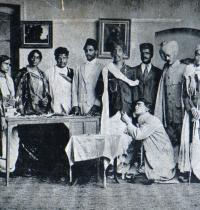Urmila Bhirdikar
Grant Period: Over one year and six months
Musician and sociologist Urmila Bhirdikar, is a teacher by profession and has done her M Phil through Pune University. She is a trained classical singer and a performer.
The performative genre called Farce, says Urmila, inaugurated a new phase in the development of 19th century Marathi theatre, which till the mid-19th century was mainly given over to mythological plays in verse. Farce signalled a move away from exclusively mythological themes to social and historical issues, and also introduced a new kind of realism in the theatre – both in theatricality and language. The word ‘farce’ itself may be taken as an indication of the ‘modernising’ of Marathi theatre.
The emergence of Sangeet Natak in Maharashtra at the turn of the 20th century, as well as of what were called ‘Bookish’ or “Prose’ plays, gradually rendered the genre of Farce outdated. The study of Farce is part of Urmila’s larger study on the theatre of female impersonation in Maharashtra from the mid-19th to the mid-20th century.
Urmila points outs that the debates on allowing women into theatre only took place in the early decades of the 20th century. According to the reformists, women ought to be allowed to play female parts in the theatre, both in the interest of realism and in the interest of granting women opportunities equal to men.
Farce brought to the fore issues about the fluidities of gender identities. Farces came to include female dances even when these were not integral to the narrative. They also began to portray female nudity and use of sexually explicit language. Farces came to criticise the social reform movements underway in Maharashtra as causing sexual harm such as the loss of virility in men and chastity in women.
Urmila is also interested in the larger implications of these issues for notions of the public sphere, for questions of high and low art, and for the development of Marathi theatre as a literary form. She is interested, for instance, in the way this theatre was located in the newspaper, where an advertisement for Farce, for instance, might share space with an editorial criticising it. She also points out that “the most noticeable issue in the emergence of Farce is perhaps the emergence of new authors”.
Urmila will write a monograph and translate two Farces into English. She will also put together an archive of documents pertaining to Farce, particularly materials in newspapers such as advertisements and notices, reviews and previews, letters to editors and responses to performances. The archive will be housed at Aalochana in Pune, which is a centre for documentation and research on women.




